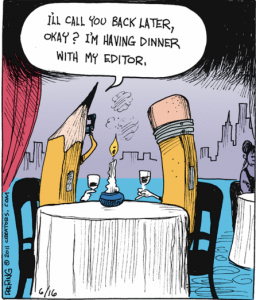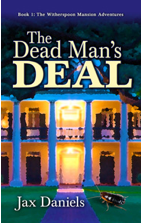I put together a bike for my brother’s kid this Christmas. Turns out, I’m pretty handy with a wrench. Thought I might try building a car next. What do you think? Should I go for it?
What you are thinking right now is a little glimpse into my head when I tell people I’m an editor and writer, and they say to me, “Oh, yeah, I’ve been thinking about writing a book. It’s about XXX. What do you think? Should I go for it?” I’m torn between trying not to smile too hard or being a little insulted. I usually land on amused.
Someone once asked me how I do what I do after I helped that person fix a pretty big hole in their novel.
I laughed and said, “Shell out thirty grand for a degree in creative writing, then pony up more for a certification program in editing, attend a dozen cons, moderate half a dozen writer workshops, participate in five writers’ groups, read an uncounted number of how-to books and unpublished manuscripts, and oh yeah, work for thirty years as an editor/writer.” What I’m trying to say, if you haven’t had your coffee yet, is that although all the people I’m talking to speak English, speaking it and writing it are two different skills.
That’s the first thing that person asking me about writing a book will need to learn because it will free them to pursue the myriad avenues that help people learn to write.
If I try to point this out gently, I have often heard the response, “Well, that’s what editors are for.”
No. No, we’re not. The tasks of editors are varied, but fixing your fiction manuscript for you isn’t one of them. I will help you, I will work with you, but I won’t do it for you. I find that people often don’t understand the role of an editor, and that has been a problem sometimes in my career. I have worked as a developmental editor (a favorite), substantive editor, technical editor, copyeditor, production editor (another favorite), proofreader, and editorial proofreader (my least favorites)—and that’s not all the kinds of editors. If you don’t know what all of these mean, you are not alone. The lines between the editing roles blur and overlap, so if I have a little trouble at where one starts and another ends…well, I thought it might be time to try to help authors out.
The Developmental Editor. DEs work with authors through the phases of writing and revision to ensure that manuscripts reach their potential and communicate clearly to readers. In my role as DE, I’ve aided in knitting parallel storylines together that should have but never met. I’ve extracted the “real” story from scattered plotting. I’ve even given one character a sex change.
When do I need one?
If you are early in your career and have a manuscript worth rescuing (meaning that it’s not headed for the bottom of a trunk if and when you realize just how much you really don’t ever want anyone to see it), you might find hiring a DE useful. Or if you are an experienced author who is under time pressure or needs help with focus in your writing efforts or storyline, a DE might help. A DE gives the author a person to bounce ideas off of, and to get creative juices flowing again. A fresh perspective can lead down very interesting paths. Teresa Edgerton helped me out with my novel in just such a fashion. I had a race of functionally immortal people (they lived so long the locals thought they were immortal) that could no longer bear immortal children. This meant their race was dying, albeit extremely slowly, and that parents would watch their now mortal children live a comparatively brief life and die. Teresa pointed out the terrible affect this would have on the society, families, and individuals. It affected the development of my story right down to the architecture. It grew into the core problem between the antagonist and his father, enriching the story immeasurably. A DE might be a means of helping lift that heavy stone, writer’s block, helping you to see work that is stale in your eyes in a new way. I once helped a person who could not get past a particular chapter. I suggested they change the point of view to another character in the scene. The author told me they’d stayed up through the night and finished the chapter.
The Substantive Editor. They perform all copyediting tasks and work heavily with sentence structure and wording to improve the flow of text and smooth transitions. They can offer rewrites for consistency, logic flow, tone, or better focus.
When do I need one?
I use my substantive editing skills when I do developmental editing, but rarely am hired to perform this function alone for fiction. But I do see a use for it because I use it in my writers’ groups and workshops all the time. A substantive edit is a good teaching tool. If you really want hands-on guidance, you might choose to work with a substantive editor. I wouldn’t make this your first lesson in writing. I suggest doing it after you have participated in workshops and writers’ groups, studied up on styles of authors you like, or read the how-to books. Once you’ve done those things, if you still feel a lack, you might want a teaching tool tailored specifically to your writing to discover your individual weaknesses and strengths.
Copyeditor. How to prepare a manuscript for publication is covered in books called style guides. Each one follows different rules for different circumstances. For instance, the big US publishers tend to use the Chicago Manual of Style (CMS) while journals often use the Publication Manual of the American Psychological Association (APA). This will dictate things such as do you represent this number as 11 or eleven? APA dictates 11, whereas CMS, eleven. A copyeditor knows the style guides and house styles and applies them and other resources to make consistent corrections to punctuation, spelling, grammar, and capitalization. They will flag inappropriate language or inconsistent tone. They may do a little research for you to check your facts. I edited a story once where a man walked into a neighborhood bar in 1923—the middle of prohibition—and I didn’t catch it. While that is not strictly the purview of a copyeditor, I still was a little embarrassed!
When do I need one?
This one’s easy: on your way to publication. Ideally you want a copyeditor and a proofreader. Please, oh please, do not send your work to press and public without a professional copyedit and proofread (or combination thereof).
Proofreader. The proofer is the last person to touch the manuscript before publication. Ideally the proofer sees the final copy that you are ready to send to the typesetter or your publishing service. The proofer generally only corrects hardcore errors. This harkens back to the use of galleys in precomputer-typesetting days. Publishers used to get a typeset manuscript on a roll. Every change cost money to retypeset, so the proofer would only correct the text if it was a real problem. Today, proofers can be a little less restricted and offer a little more intensity, but in essence, they are still correcting only errors that the author and other editors may have missed.
When do I need one?
Right before you go to press. I’ve been working on my manuscript forever. The first chapter has been edited, proofed, and massaged ad nauseum over the course of years. Last month I still found a dropped word. Try not to touch your text after the proofer is done. That just introduces opportunity for error. Trust me—I can’t tell you the number of times a last minute change has introduced error.
Often times some of these roles double up. For instance, owing to time or money constraints, you might combine the role of copyeditor and proofer (which is what an editorial proofreader is). Though in an ideal world, your copyeditor and proofer are different people, most copyeditors will do this. I often double up the role of developmental editor with substantive editor to offer a little story-level help and a little writing improvement. Don’t hire someone to do all the roles. The most I’m comfortable with when I’m combining roles is two. After that, I get too involved in the text to see it clearly in much the same way as the author does. If I’ve done developmental and substantive editing, I really don’t want to be responsible for the proofreading.
Editing is expensive, and many new authors don’t have the luxury of hiring an editor right away. Don’t despair. You can get some of these benefits from a writers’ group or workshop in the early stages of you work. I know that participating in a writer’s workshop has drawbacks. For example, controlling your time frame is harder. You have to determine the quality and applicability of the feedback. The other participants may know something is not right, but not know how to articulate it. You also have to devote a lot of your time to other people’s manuscript problems. However some of these drawback turn into boons. You get better at your own writing when you critique others, and you discover the wonderful sense of community that is out there for writers. You also will have a head start on working with your editor once you’ve undergone the critique process.
So there is your primer on editing. Now go ahead. Ask me again. So what do I think? Should you go for it? Should you write that book?
Absolutely. The only way that first story in you becomes a novel is if you write. But remember, that is the first step in a long flight of stairs. If you need help, we editors will be here.





